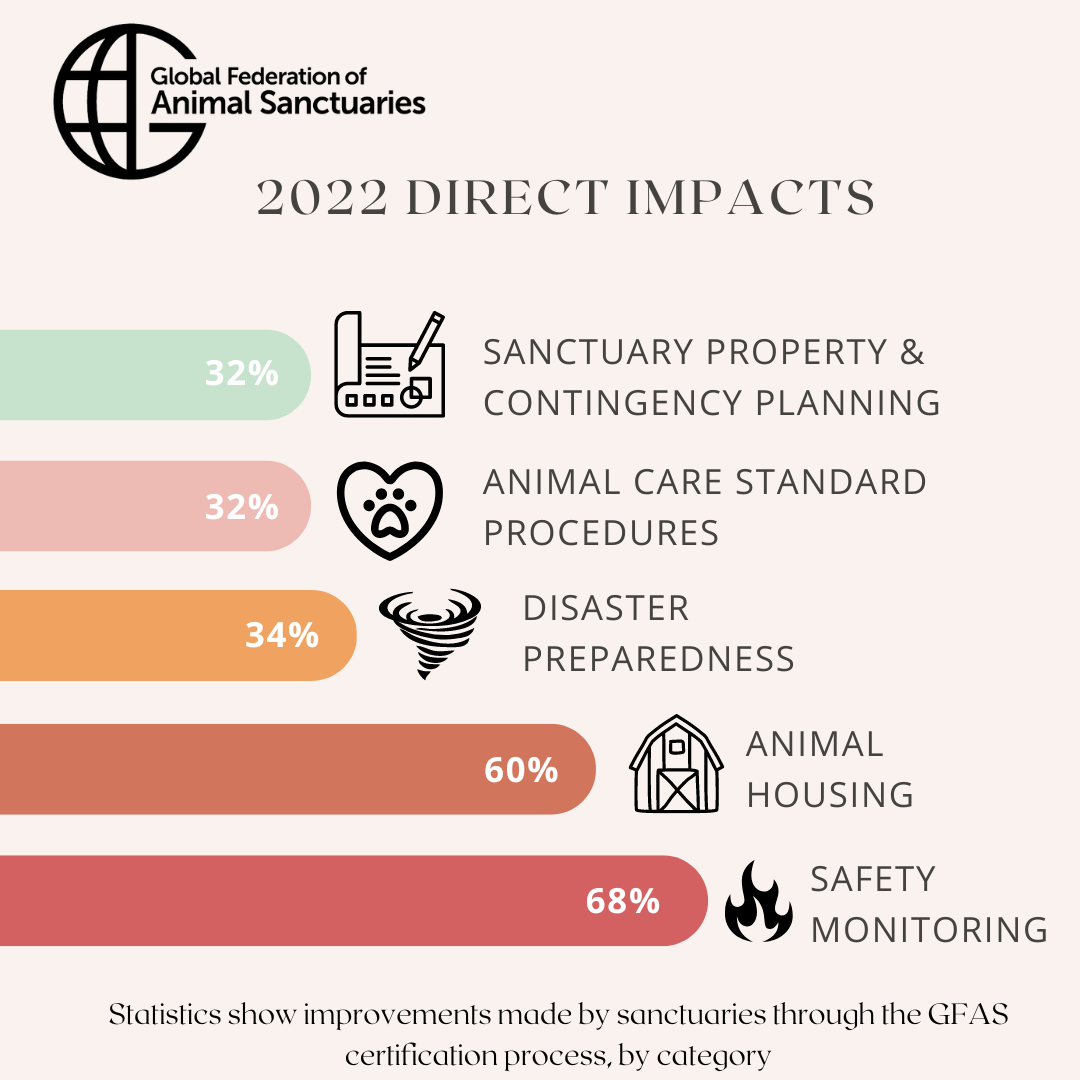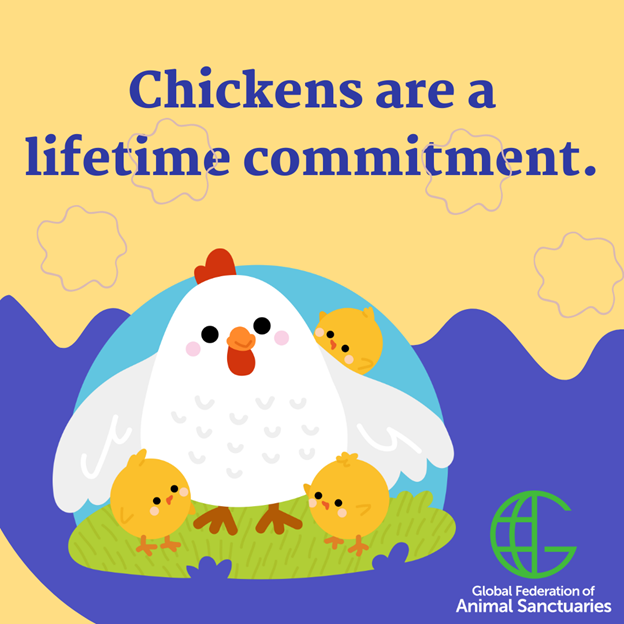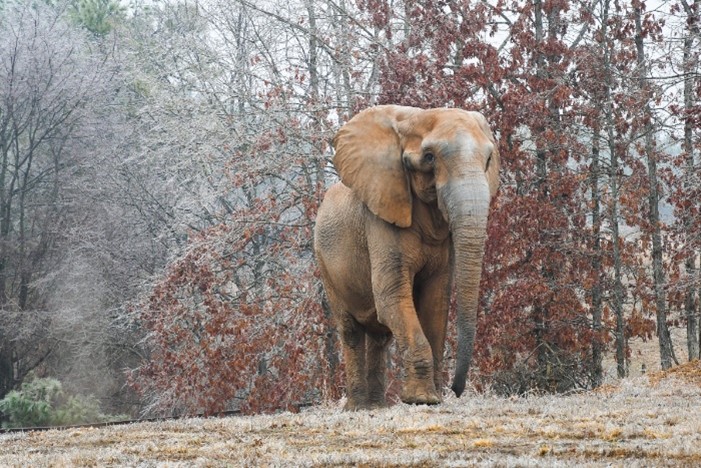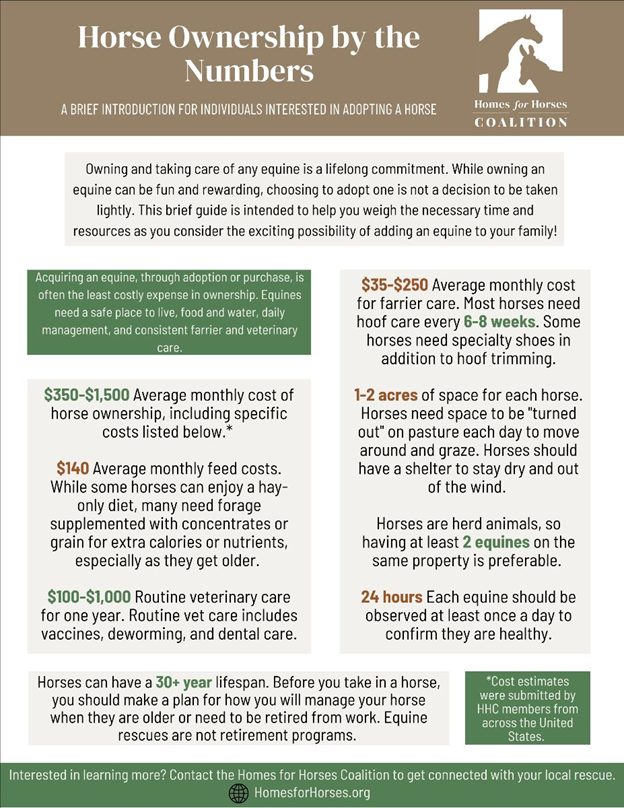Global Federation of Animal Sanctuaries: Accreditation Impact

For Accredited and Verified organizations, the value of the GFAS certification process is undeniable. Demonstrating and maintaining alignment with Standards for the proper space, enclosure, diet, and social needs of each individual animal as well as for organizational health and sustainability is no easy feat! The proof of the value of accreditation can be seen in the details and as such, GFAS is extremely proud to present this 2022 report of the direct impact of accreditation.
From January to December 2022, 50 animal sanctuaries, rescues, transition, and rehabilitation centers were newly certified or renewed by GFAS. Actions and improvements implemented by organizations to come into alignment with GFAS Standards, either during the accreditation process or as requirements prior to certification, were documented and tabulated.
Table 1 shows the most frequent actions/improvements made by organizations as a direct result of their involvement in the GFAS accreditation process.
GFAS Accreditation Impacts on Organizations
January-December 2022
| Category/Standard | % of Groups Impacted |
| Security: General Safety Monitoring | 68% |
| Animal Housing | 60% |
| Disaster Preparedness | 34% |
| Animal Care Standard Procedures | 32% |
| Ownership of Sanctuary/Rescue Property and Contingency Planning | 32% |
Security: General Safety Monitoring
Let us take a closer look at the top area of accreditation impact, GFAS Standard PF-6. This Standard requires that Appropriate fire extinguishers and alarms are in place and in working order, weather is monitored, and all physical features of the sanctuary are designed and maintained to ensure the safety of the animals. The most common changes implemented by organizations which made improvements in this area included upgrades to the fire safety of their facility by installing sufficient alarms and fire extinguishers, additional measures to protect animals from fire, flood and hazards (such as removing hazardous and flammable materials), and renovations to electrical, heating, and cooling equipment.
Animal Housing
The second area of impact, GFAS Standard H-1, states Animals are safely contained. Unless otherwise directed by a veterinarian, and for a specified medical reason, animals are provided sufficient opportunity to move about freely and rapidly, and to exercise choice in location so as to maintain positive welfare. Actions in this area ranged from maintenance and repair of enclosure fencing for safety and to guard against potential escapes to improved habitat and living conditions which meet species’ specific needs, offering greater opportunity and space for freedom of movement
Although some of these changes seemed simple, such as the addition of a fire alarm or a fire extinguisher, each improvement that can potentially prevent a disaster, save a life, or improve animal welfare is invaluable. GFAS is greatly appreciative and proud of the commitment to best practices displayed by our certified organizations, for the benefit of the animals. We are honored to recognize and support these outstanding organizations that not only provide high-quality care for animals but also engage in sustainable practices – True Sanctuaries.
Can we prevent this year’s chick purchasing?
Ask any farmed animal sanctuary, and they’ll tell you that this time of year, they’re bracing for the calls about neglected and unwanted roosters, hens, ducks, and rabbits. Easily purchased on a whim, even well-meaning folks get chicks in springtime, failing to account for the lifetime of specialized care these animals require.
This year, avian influenza has made a bad situation worse. Due to mass killings of birds by industrial agriculture to quell the spread of avian influenza, a disease sure to damage their profits if not their conscience, egg prices have gone up. This has led to people thinking, “Maybe I’ll just get a few backyard hens to lay eggs” instead of paying this premium. But the same disease that drove up egg prices is the same one posing a deadly risk to backyard birds and sanctuary residents alike.
This increased demand, paired with the typical rush on chick purchasing in the Spring, will lead to birds being at the hands of those who inevitably will be unable to care for them in the long run. Lack of knowledge on appropriate care, zoning rules, safe housing, and available medical care will see sanctuary phones ringing off the hook with pleas to take on animals people were ill-prepared for. But because avian influenza poses the same risk to birds in sanctuary (if the disease doesn’t kill them, the government will), many sanctuaries cannot take in new birds. Most sanctuaries are operating at capacity anyway.
But we know we’re preaching to the choir. So, let’s turn our attention to educating the public together, and turn the tide for these poor birds. Below, we’ve included a shareable graphic and text you can cut and paste to your own social media, to shine some light on this issue.
————————————————————————————————————————
 Right click on the image above and select Save Image As to use in your own social media.
Right click on the image above and select Save Image As to use in your own social media.
Think twice before purchasing that chick this Spring.
Not only is the care and treatment of chicks in stores far from humane, but are you sure you’re ready to provide a lifetime of bird care?
Chickens require:
- Zoning that allows for hens and roosters
- Predator-proof, regularly cleaned housing
- Regular & sometimes emergency checkups with a specialized vet
- Consistent care & feeding – in all weather
- Caregiving arrangements when you travel
- Protection from avian influenza
- Knowledge of their unique needs and care
Caring for animals is a lifetime commitment- don’t put the burden on sanctuaries.
*If you’re looking for a great alternative, try Just Egg or other delicious plant-based egg replacers in your recipes. For spring gifts for children, consider visiting or sponsoring a sanctuary resident instead!
Lifetime Care of a Horse – What Does it Cost?
What a great resource, from our partner organization Homes for Horses Coalition (HHC). According to Tessa Archibald, Manager of HHC, ‘Horse Ownership by the Numbers is a fact sheet designed to be a brief introduction to the world of horse care. A survey of HHC members provided insight into the wide range of costs associated with horse ownership across the country…’
This graphic isn’t meant to discourage adopting and caring for a horse, pony or donkey, but it does help those interested to understand that equine ownership is a lifetime commitment, and that providing proper care can be expensive. To learn more about Homes for Horses Coalition, go to: https://homesforhorses.org/.
Another great resource to share with horse owners in your community is the United Horse Coalition Resource Database at https://unitedhorsecoalition.org/equine-resource-database/. This page lists several links offering assistance for horse owners, such as feed banks and discounted veterinary services, to help keep horses in their homes.
European Alliance for Rescue Centres and Sanctuaries (EARS) Webinar – Holistic Care of Rescued Bears
March 17th 3-4pm CET.
Please join EARS for a webinar led by Nic Field of Global Animal Welfare, formerly from the Animals Asia Foundation. This will be a really interesting talk which will be of interest even to those that don’t care for bears. Click here for detailed information about this webinar, and to register.
Sanctuary Resources Portal for GFAS Certified Organizations
A reminder to GFAS certified organizations, the Sanctuary Resources Portal on our website is now open. The portal contains:
- Samples and Templates, which include some documents required for GFAS certification as well as other helpful documents. We also invite you to upload sample documents or policies that you think would be helpful to other GFAS groups. If you have attended any of the recent GFAS roundtables, you will be aware that many times our attendees ask for ways to share information, and this part of the portal was born out of that request.
- A Contact Directory, which you can use if you are looking for help regarding specific issues within your organization, or even if you just want to connect with others in the same area of expertise as you. We are putting together a short video to help you in learning how to sort and download contact information. Please make sure to add your contact information, as well as others within your organization who may be willing to help mentor or respond to questions from other GFAS groups.
- One spot for all important GFAS links.
- Information regarding additional benefits available to you as a certified GFAS organization.
We can only have one account per organization; however, you can feel free to share that account information with anyone on your team. In order to get your account set up, please complete this short form, just asking for name, email and organization: https://forms.gle/Z4ccvUQh7PM3VGus6. Make sure once you are signed up to add your contact information to the directory.
GFAS Accredited The Elephant Sanctuary Welcomes Special New Resident

GFAS Accredited, The Elephant Sanctuary, (TES) in Hohenwald, Tennessee has welcomed a special new resident. This past January, Artie, a 40 year old, African male elephant, was transported from the North Carolina Zoo in Asheboro, to his new home at The Elephant Sanctuary. Preparation for the move involved a specially designed, climate-controlled crate, and positive reinforcement training sessions to get Artie comfortable with entering it. On the day of the move, multiple drivers took turns steering the massive trailer toward Tennessee, with caregivers, veterinarians and other specialists following closely behind. Stops were planned along the way that would provide Artie with an opportunity to rest, eat and drink water. Once the caravan arrived at the sanctuary, and Artie was introduced to his new home, some North Carolina zoo staff stayed on in an effort to help acclimate him to his new care team and environment.
Since his arrival, Artie has explored the forested hills, and taken down some small trees just for fun. By now, he understands he’s free to exercise choice, and over time he’ll experience specialized and attentive care on his terms. At present, Artie has access to heated indoor stalls that open to a multi-acre habitat, but eventually he’ll gain access to a large new indoor barn and habitat when construction is completed later this year. Along with the new housing will come social opportunities with other African elephants and a natural landscape to roam as he wishes.
As a wild, young elephant, Artie once traversed Zimbabwe’s rolling plateau alongside his family. In a violent culling operation carried out by the government, Artie’s family was killed and he was removed from his homeland and shipped to the United States in 1986.
Welcome to true sanctuary, Artie. May you remember who and what you are in the peaceful, rolling hills of Tennessee.
To learn more about Artie and the other residents at The Elephant Sanctuary, please visit: The Elephant Sanctuary in Tennessee
Farm Sanctuaries Demonstrate the Power of Patreon
 Sanctuaries consistently have to work to raise money for the care of residents and other programs. Recurring donations are one of the most powerful assets for sanctuaries to ensure a consistent income stream throughout the year. Recently, Accredited Iowa Farm Sanctuary did a “Patreon Drive” in which they used email and social media to challenge 20 supporters to join their Patreon. The response ended up getting them 56 new monthly donors! Other true sanctuaries using Patreon include Accredited Piedmont Farm Animal Refuge, Verified Juliana’s Animal Sanctuary, Accredited Skydog Sanctuary, Accredited Magical Creatures Sanctuary, Accredited Blackbird Ranch, Verified Barn Sanctuary, and more!
Sanctuaries consistently have to work to raise money for the care of residents and other programs. Recurring donations are one of the most powerful assets for sanctuaries to ensure a consistent income stream throughout the year. Recently, Accredited Iowa Farm Sanctuary did a “Patreon Drive” in which they used email and social media to challenge 20 supporters to join their Patreon. The response ended up getting them 56 new monthly donors! Other true sanctuaries using Patreon include Accredited Piedmont Farm Animal Refuge, Verified Juliana’s Animal Sanctuary, Accredited Skydog Sanctuary, Accredited Magical Creatures Sanctuary, Accredited Blackbird Ranch, Verified Barn Sanctuary, and more!
If you’re not familiar with the platform, Patreon serves as a membership platform in which patrons of a sanctuary can commit to a monthly donation, in return for access to exclusive content published on Patreon. For sanctuaries, this often means behind-the-scenes photo and video, early access to news and rescues at the sanctuary, and exclusive stories about the residents. Not only is this a fun way to engage donors, but it is an excellent way to demonstrate transparency in the ongoing work at the sanctuary.
Patreon is often used as another option alongside monthly resident sponsorships and other recurring general donations. Patreon takes a percentage of donations for use of the platform. But for sanctuary superfans like us – getting extra news and media from the sanctuary in our inbox is super appealing.
If you’d like to learn more about Patreon, visit https://www.patreon.com/.
New Certifications and Renewals
Over the past month, GFAS has certified three new organizations, transitioned one organization from Verified to Accredited status, and renewed two GFAS organizations!
Congratulations to all these groups!
New Certifications
Blackbird Ranch Farm Sanctuary, Washington
Thoroughbred Retirement Foundation – Pleasant Valley State Prison, California
Thoroughbred Retirement Foundation – Central Maryland State Correctional Facility
Transition from Verified to Accredited Status
Dove Creek Equine Rescue, Texas
Renewals
ResQue Ranch, Inc., California
Skagit Animals In Need, Washington

